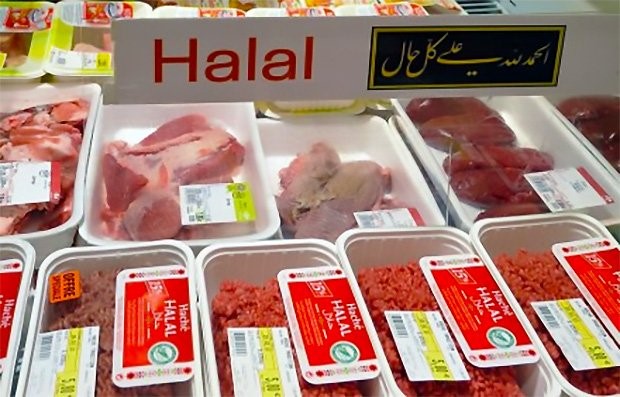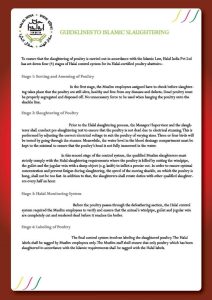
What's halal meat? What's Hindutva groups' beef with it?
'Halal' refers to the slaughter and preparation of meat in line with Islamic practices; the Hindu right-wing views its trade as 'economic Jihad'

After the hijab, the Hindutva groups in Karnataka seem to have turned their ire on halal meat. It is not clear what has got their goat all of a sudden, but as the state Chief Minister Basavaraj Bommai put it, this is “a practice” that has been going on.
Bommai also promised to study the “serious objections” against halal meat and “look” into it. If his response sounded suspiciously similar to his government’s initial reaction to the hijab controversy, one may know where this “study” is headed.
However, protests against halal meat have not sprung up from nowhere, as right-wingers in India have always had their reservations about it. In the midst of the pandemic and at the height of the migrant crisis around May 2020, a hashtag was trending on social media, #BoycottHalalProducts, ostensibly driven by right-wing groups. In October 2021, Sri Ram Sene and Hindu Janajagruti Samiti raised the threat of “halal” as economic jihad and wanted to know why halal certificate is being imposed on Hindus in the country.
According to them, earlier, halal certification was restricted to only meat products but now it has been extended to vegetarian products, cosmetics, medicine and even hospitals. And for which a requisite fee had to be paid to Halal India, Jamita Ulema-e-Hind and other Islamic organisations, said the two pro-Hindu groups, who had pointed out that this money was used to fund terrorist activities and wanted a ban on halal products during Deepavali.
In November 2021, the BJP in Kerala too started a campaign demanding that the state government ban the “halal system” and halal boards at restaurants. Simultaneously, there was a disinformation campaign afoot that Muslims spit on food items to make them halal. Hence, now and then, this bogey is raised in different parts of the country.
Also read: Two BJP leaders question ‘madness’ behind boycott of Muslim traders at temple fairs
What is halal meat?
The term ‘halal’ usually refers to the slaughter and preparation of meat in line with Islamic practices. But its meaning within Islam is far broader. ‘Halal’ is Arabic for ‘permissible’, what is allowed, as opposed to ‘haram’, that which is not permissible or unlawful. In foods, they cannot eat pork and blood, as well as meat from birds of prey and reptiles.
In short, halal food is that which adheres to Islamic law, as defined in the Koran. It pertains to the way Muslims should slaughter animals or poultry – which is done through a single cut to the jugular vein, carotid artery and windpipe with a sharp instrument. The blood is then allowed to drain from the body.
Before any slaughter, the God’s name must be invoked as well in a one-line blessing called the Tasmiyah. Reciting a short blessing beginning with “bismillah” (in the name of Allah) then is a prerequisite for Muslims before killing the animal.

How does halal differ from Kosher practice?
There’s not much difference in their style of slaughtering. Both halal and kosher diets have guidelines regarding how meat should be slaughtered prior to consumption. In the case of Jews, for their meat to be considered kosher, it must be butchered by a shohet, who is a person trained to slaughter animals in accordance with Jewish laws. The word kosher derives from the Hebrew word “kashrut,” which means proper or fit.
For Jews and Muslims, all the blood must be removed before it is cooked. Jews, who have trained for a minimum of seven years, use a chalaf, a surgically sharp instrument twice the width of the animal’s neck, to slaughter the animal.
Both Jews and Muslims claim that their act of slitting the throat “stuns the animal” and “there is no delay between stun and subsequent death”, therefore causing the animal no pain.
Animal health experts and campaigners disagree. The Royal Society for the Prevention of Cruelty to Animals (RSPCA) argues that killing animals without stunning them causes “unnecessary suffering”. Activist group PETA calls halal slaughter “prolonged torment”, saying the animals “fight and gasp for their last breath, struggling to stand while the blood drains from their necks”.
The meaty business of Halal
There has been a growing demand for halal meat and foods in the world and in India, as consumers have become more conscious about it. The market is projected to grow from $2.09 trillion in 2021 to $3.27 trillion by 2028, exhibiting a CAGR of 6.56 per cent, said a Fortune Business Insights report. The rise in CAGR has been attributed to the growth in demand for halal products in Islamic countries and Muslim populations.
India is one of leading suppliers of global halal meat along with other non-Muslim majority countries like Brazil and Australia.
Also read: Govt export body drops ‘halal’ from red meat manual
Why is halal meat preferred over regular meat?
Halal meat is considered to be more tender, and reportedly stays fresh longer. For the 2.5 billion Muslims in the world, it is closely linked to their religion.
In India, most consumers are unaware of the difference between halal and regular meat and opt to purchase meat from their local butcher, who is often a Muslim. The halal way of slaughtering the animal is considered to be less harmful to the animal as well.
Why is a section of Indians against halal meat?
Largely, it is the Hindutva groups who are against halal meat, calling for a ban. According to BJP general secretary, CT Ravi, halal is an “economic Jihad”. He explains that it is used like a Jihad (religious war), so that other communities cannot do business in meat. “It has been imposed. When they think that halal meat should be used, what is wrong in saying that it should not be used?” Ravi asked reporters.
He said the halal meat offered to ‘their God’ is dear to them (Muslims) but for Hindus, it is somebody’s leftover. He added that halal has been designed such that the products are purchased only from Muslim traders and not others.
“When Muslims refuse to buy meat from Hindus, why should you insist on Hindus buying from them? What right people have to even ask this?” Ravi asked, adding that if Muslims agree to eat non-Halal meat, then Hindus will also use halal meat.
‘No-pious meat’
The meat sold in Muslim shops is not pious, said Mohan Gowda, state spokesperson of the Hindu Jana Jagruthi Samithi. As part of the Hosathodaku celebrations, the day after Ugadi in Karnataka, non-vegetarian food cooked in households is offered to gods and goddesses, but Muslim traders sell meat only after offering it to their god, Gowda said.
“So, it is not suitable for our celebrations. We have decided to boycott meat sold by Muslim traders,” said Gowda, pointing that they would have no objection if Muslims sell non-halal meat.
It is not just the right-wing groups, the government too played along. Recently, the Agricultural and Processed Food Products Export Development Authority significantly removed the word “halal” from a red meat manual, which specifies the contours of meat export amid allegations by right-wing Hindutva groups that it gives Muslim exporters an unfair business advantage.
Export issues
The government’s reasoning back then was that meat is primarily exported to the Middle East, where the requirement is halal meat. But, according to salaamgateway.com, India continues to export meat by Islamic requirements despite the government dropping the ‘H’ word! The removal of the mention of ‘halal’ earlier this month from India’s red meat manual will not have any impact on the country’s halal meat export, said industry players on the website.
The Agricultural and Processed Food Products Export Development Authority (APEDA) reportedly did not want to give the impression that APEDA-approved plants must produce meat only with the halal method which was objected to by some groups in India since the country is a secular one, said the report on the website.
However, this move is not expected to impact the companies’ exporting halal meat. But the politics over halal meat continues to play out as one more sign of intolerance against minorities in the country.

